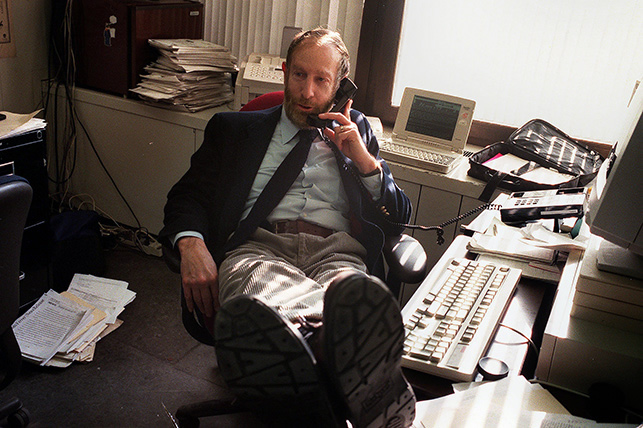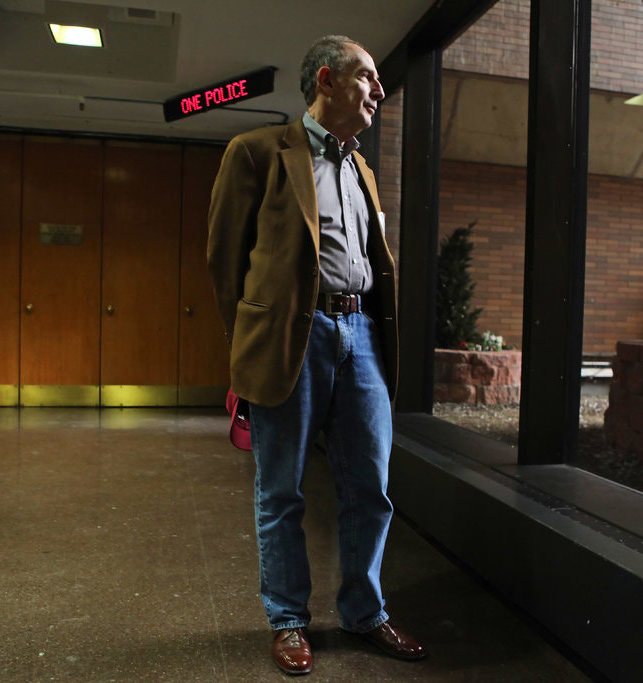

Leonard Levitt, Reporter Who Riled N.Y.P.D. Brass, Dies at 79
By Sam Roberts
May 19, 2020
His newspaper column, books and blog sought to hold the police accountable, and his reporting reopened a murder case against a Kennedy cousin in Connecticut.
Photo: Nancy Siesel/The New York Times. See larger version of photo.
Leonard Levitt, a journalist and author whose investigative and gossipy revelations of wrongdoing by the New York City police made him a must-read as the self-anointed conscience of Police Headquarters, died on Monday at his home in Stamford, Conn. He was 79.
The cause was complications of lung cancer, his daughter, Jennifer Levitt, said.
A fiercely independent reporter for the now-closed New York Newsday starting in 1985, Mr. Levitt was lauded as a reform-minded inspiration by his supporters and attacked as a nit-picker by his critics.
An article he wrote in 1991 spurred a re-investigation of the 1975 killing of Martha Moxley, a teenager in Greenwich, Conn., which led to murder charges against Michael C. Skakel, a neighbor and cousin of the Kennedys.
Mr. Levitt accused the local police of deferring to the Skakel family in the early stages of the investigation, which he detailed in the book “Conviction: Solving the Moxley Murder: A Reporter and a Detective’s 20-Year Search for Justice” (2004), written with Frank Garr, the prosecution’s lead investigator.
That labyrinthine case provided tabloid fodder for nearly three decades. Mr. Skakel was found guilty of murder in 2002, but the conviction was overturned by the Connecticut Supreme Court in 2018. Prosecutors appealed, but the United States Supreme Court declined to revive Mr. Skakel’s conviction the following year.
Mr. Levitt’s other books include: “NYPD Confidential: Power and Corruption in the Country’s Greatest Police Force” (2009); “The Healer: A True Story of Medicine and Murder” (1980), about a Long Island doctor, Charles Friedgood, who was convicted of killing his wife; and “The Long Way Round” (1972), a novel about growing up.
Mr. Levitt was probably best known as a New York City police reporter who pulled no punches. His reporting ranged from revelations that Muslim communities were being kept under surveillance after the World Trade Center attack in 2001 without specific evidence of wrongdoing, to a rumor that a deputy commissioner’s dog was nipping her colleagues in the office.
After he had left New York Newsday in 1995, the year the newspaper closed, and began his NYPD Confidential blog in 2005, the Police Department said he no longer qualified for credentials that allowed him to pass police barricades. It even barred him from Police Headquarters for a time. After the department rescinded his press card, he enlisted the help of the New York Civil Liberties Union and won it back.
Still, he defended the department at times. In 2013 he disagreed with an article in The New York Times when it reported that an officer’s secretly recorded words about stop-and-frisk tactics suggested that a person’s race was a deciding factor in who was stopped. “There is a much more nuanced picture” that The Times was not presenting, Mr. Levitt wrote on his blog.
But he also refused to give the long-serving Police Commissioner Raymond W. Kelly, who could be as stubborn as Mr. Levitt, the benefit of any doubt. He wrote, without qualification, for example, that “Kelly has frozen out all those who disagree with him.”
“His column became dated and shifted toward gossip after his departure from Newsday,” said Paul J. Browne, a deputy commissioner for public information under Mr. Kelly. “Still, he persevered with no cooperation from me, which was an achievement in itself.”
Alice McGillion, who was one of Mr. Browne’s predecessors in the 1980s, described Mr. Levitt as a “journalist advocate for reform” who followed his own path.
“Reform maybe is a loaded word, but it is reform in his mind — an injustice or something that made no sense,” Ms. McGillion said. “My friends in the department would not necessarily agree, but I do think that voice will be missed.”
Leonard Hugh Levitt was born on April 27, 1941, in the Bronx to Boris and Celia (Kossovsky) Levitt. His mother taught English at Hunter College in Manhattan; his father, who was known as Ben, ran an import-export business.
Len was raised in the Five Towns area of Long Island, graduated from the nearby Woodmere Academy and earned a bachelor’s degree in 1963 from Dartmouth College, where he majored in history.
After serving in the Peace Corps for two years teaching English in Tanzania, he graduated from the Columbia University Graduate School of Journalism, worked for The Associated Press, The Detroit News and Time magazine and joined Newsday, on Long Island, in 1975, 10 years before it launched its New York version.
He left the paper in 1979 to work briefly for The New York Post, then was awarded a Rockefeller Foundation grant to find the students he had taught in Africa and write about them. The project led to an article in The New York Times Magazine in 1982 and an essay in his book “Going Up Country.” He began his New York Newsday column, One Police Plaza, in 1985.
In addition to his daughter, he is survived by his wife, Susan (Gina) Levitt; his son, Michael; and a granddaughter.
“Whatever he covered, he immediately alienated the mainstream sources, the leadership, and thus ingratiated himself with the disenfranchised and the unhappy,” John Miller, a former deputy police commissioner for public information — and now the deputy commissioner for intelligence and counterterrorism — told The Times in 2000. “They are much better sources.”
Still, Mr. Levitt became required reading at Police Headquarters. “Lenny was usually a good read unless he was writing about you,” Mr. Miller said in an email on Monday.
Murray Richman, a longtime defense lawyer from the Bronx, described Mr. Levitt as “the last angry man.”
Would Mr. Levitt himself have made a good cop?
“Definitely not,” Mr. Richman said in a phone interview. “A cop must compromise, and Len couldn’t compromise. He didn’t accept the excuses of why you couldn’t do the right thing.”
Photo: Nicole Bengiveno/The New York Times
Read more obituaries or go to complete archive of articles.

 Mr. Levitt in 2009 at One Police Plaza — the name he gave his New York Newsday column on the doings of the N.Y.P.D.
Mr. Levitt in 2009 at One Police Plaza — the name he gave his New York Newsday column on the doings of the N.Y.P.D.